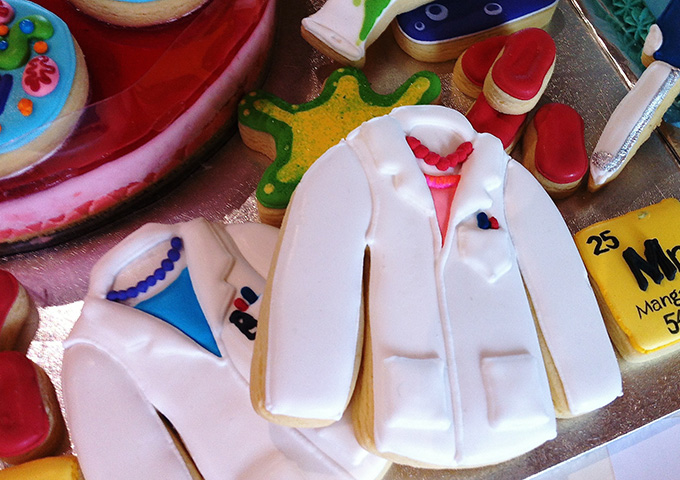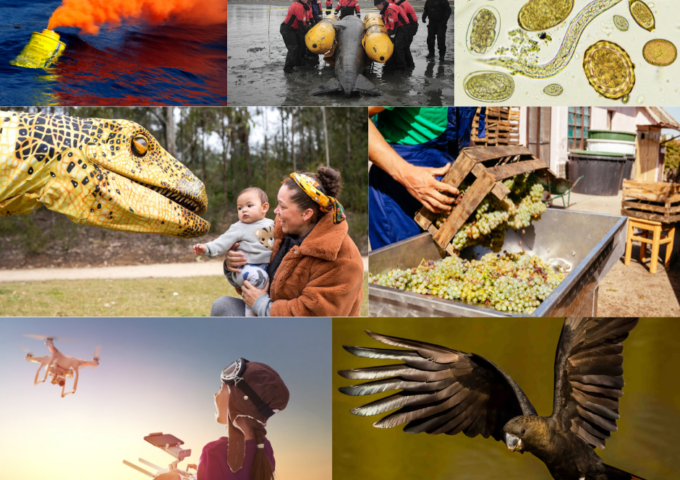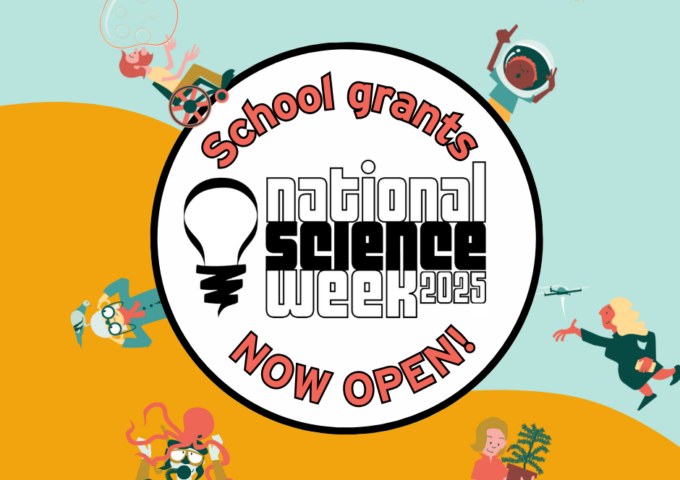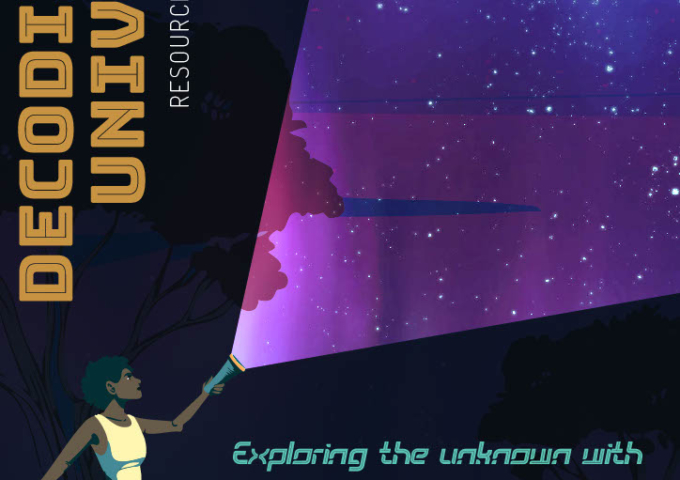- The Aha! Challenge: test your creative brain for science (national)
- DNA and longevity—Australian Nobel Laureate Elizabeth Blackburn in Canberra and Sydney
- Apollo 11, saving our oceans, and maths with Mr WooTube at Sydney Science Festival
- What’s a polar vortex? Will warming ruin wine? And other climate questions, in Tasmania
- The science of wine, from growing grapes to sensory experience, at Big Science Adelaide
- Life on Mars: is there any? Could we live there? in Perth
- Think your way out of cancer-themed escape room in Queensland
- Science in the garden and the war on waste, in Alice Springs
- Pee power, sewer soap and plastic-munching critters: challenging our disposable society in Melbourne
- Plus many more events and activities.
International guests
- NASA exobiologist Darlene Lim who is mimicking Mars missions in the Earth’s most inhospitable places, paving the way for space colonisation
- Mitch Schulte—NASA Mars 2020 rover mission program scientist
- ‘Her Deepness’ Sylvia Earle—US marine biologist and National Geographic explorer
- Michael Aw—US underwater nature photographer, author and explorer
- Andrea Boyd—Aussie mechatronic engineer and International Space Station Flight Controller, now based at the European Astronaut Centre
- Paul Davies—English physicist, author and broadcaster
Local science stars
- Elizabeth Blackburn—the Nobel Laureate who discovered the molecule that stop our chromosomes from fraying
- Lisa Harvey-Smith—the Essex-expatriate-turned-Australian astrophysicist, Stargazing Live TV presenter, Women in STEM Ambassador, and author of the book When Galaxies Collide
- Alan Duffy—astrophysicist, RiAus Lead Scientist and TV science presenter, and fellow Swinburne University astrophysicist Rebecca Allen lead a virtual reality tour of the Universe
- Veena Sahajwalla—waste warrior and inventor of green steel
- ‘Mr WooTube’ Eddie Woo—Australian of the Year Local Hero-winning maths teacher
- Craig Reucassel—loveable scamp, science supporter and host of ABC’s War on Waste
- Dr Karl Kruszelnicki—author and science communicator.
National activities
The Aha! Challenge: Test your creative brain for science—online
You know that feeling of ‘aha’? It’s that flash of insight you get when pieces of information fall into place, revealing a deeper meaning or understanding.
It’s a critical contributor to scientific, mathematics and creative discovery, and researchers are really keen to know how it changes over our lifespan. Does that feeling of excited discovery change over our life?
Contribute to real scientific research from the comfort of your own home by participating in the ABC’s National Science Week project ‘The Aha! Challenge’. Participants will do a series of online tests designed to elicit insight and draw out creativity, helping scientists understand how the human brain works.
The Great Aussie BioQuest
Saturday 10 to Sunday 18 August
Submit your wildlife sightings using your smartphone and help scientists study how climate change is influencing where the wild things are.
QuestaGame is a smartphone app where users can log sightings of real wildlife. They can then identify the plant or animal or wait for an expert to help. All sightings are expert-verified and given a remarkability score.
The data is then shared with the Atlas of Living Australia to help researchers make better decisions about protecting the environment.
Ready to join thousands of players across Australia in a team-based, outdoor game that will help protect our environment? Join the Great Aussie Biodiversity Challenge 2019.
Results appear live on the website, displaying the latest finds, as well as the rankings of each science hub team and the top individual players. Prizes are awarded for highest scores in sightings and identifications, as well as active participation. Event details.
The hunt for the Plastic Eaters—multiple dates & locations
Thursday 1 to Saturday 31 August
Plastic-eating bacteria and biohacking are two of the topics covered as part of DISPOSABLE at Science Gallery Melbourne.
Biohacking group BioQuisitive asks participants to culture bacteria in the search for a new species that could solve our plastic waste dilemma.
Building on the research of Japanese plastic-eating bacteria expert Dr Shosuke Yoshida, the challenges is: can we develop a new plastic-eating bacteria in Australia?
DISPOSABLE is third sci-art pop-up season for Science Gallery Melbourne. Activity details.
Australian Capital Territory
U4D: The Universe in 4 Dimensions – an Astronomy/Arts Collaborative—Canberra
Sunday 18 August
A trip through space and time using dance and animation.
Astronomers and artists are taking a four-dimensional trip through space and time. ASTRO 3D astronomers, who research the Universe from soon after the Big Bang to the present-day, will work with dance artists Liz Lea and Eric Avery, photographer Jen Brown, and animator James Josephides.
They’ll create an arts/science performance exploring the key concepts of ASTRO 3D research, including the origin of the Ionised Universe and of the Periodic Table.
The aim is to place the human body in space while seeking connections with cultural histories including the Dreamtime and recent discoveries being made by astronomers. Event details.
Droughts and wild weather: Living with climate change—Acton
Sunday 18 August
A panel of experts will discuss what our future looks like under climate change.
The Earth’s climate is warming. Severe weather events are becoming more severe and affecting more and more people. In Australia droughts are becoming longer and more severe and winter rainfall in southern Australia is decreasing.
How can we adapt to live in this warmer world? What can we do to prepare ourselves for these changes? What impacts are these changes going to have on local, regional and global scales?
Panel experts include:
- Professor Jamie Pittock FSES, ANU (Adaptation)
- Dr Liz Hanna, ANU Climate Change Institute (Health)
- Emeritus Professor Janette Lindesay FSES, ANU (Climate)
- Dr Annette Hirsch RSES, ANU (computer modelling)
- Dr Matthew Colloff FSES, ANU (Water and Murray Darling Basin issues)
- Dr Steven Crimp, ANU Climate Change Institute (Agriculture)
This event will be hosted by Dr Kate Auty, ACT Commissioner for Sustainability and the Environment. Event details.
Living longer and healthy ageing: a conversation with Australian Nobel Laureate Elizabeth Blackburn—Canberra
Tuesday 13 August
What can DNA tell us about living longer and healthy ageing?
Nobel Prize winner Professor Elizabeth Blackburn will be on stage in conversation with Science & Technology Australia CEO Kylie Walker.
Professor Blackburn is a world-leading expert on telomeres—the protective caps at the end of our chromosomes—which play an important part in keeping us healthy as we age. She will discuss her research, and what you can do to keep your telomeres in good shape. Event details.
New South Wales
Maths with Mr WooTube, saving oceans, what is life?, bees, bush medicine, the new climate change activists, and more at the Sydney Science Festival
- Can our oceans and their creatures survive climate change, runoff and rubbish? Find out from National Geographic explorer ‘Her Deepness’ Sylvia Earle and marine ecologist Emma Johnston.
- Find out about the hidden world of math from teacher ‘Mr WooTube’ Eddie Woo
- From student strikes to CLIMARTE, experts discuss activism in the age of climate change
- What is life? Author and physicist Paul Davies shares his answers
- Days of our hives: a comedic look at beekeeping and the science of bees
- Dinosaurs vs Superpower at Science in the Swamp
- Maths and music, dark matter, Apollo 11, telomeres and ageing with Elizabeth Blackburn, a night of illusions, art/science activities, Dr Karl, the periodic table, and more.
These are just some of the highlights of this year’s Sydney Science Festival, 6 to 18 August.
Tens of thousands of visitors are expected to attend hundreds of events across dozens of venues in Sydney, including the Powerhouse Museum, the Australian Museum and the Australian National Maritime Museum, Centennial Parklands, The Royal Botanic Gardens, Taronga Zoo, university campuses and local libraries. Festival details.
INDIGI HACK 2019—Redfern
Thursday 8 to Friday 9 August
INDIGI HACK is a two-day hackathon involving Indigenous youth. The winning hacker gains entry to an incubator to further develop and refine the product.
Can young people’s love of gadgets and technology help save Indigenous language?
Australia is home to some of the oldest languages in the world, and we are at risk of losing them all if we don’t act fast. As many as half of the world’s 7,000 languages are expected to be extinct by the end of this century; it is estimated that one language dies out every 14 days.
This initiative helps Indigenous young people bridge science, technology and culture to develop an app that helps capture, revitalize and retain Indigenous language. Event details.
Riverina Science Festival 2019—Wagga Wagga
Sunday 11 to Saturday 17 August
A week-long festival across Wagga Wagga with interactive science-based programs across a number of venues for all age groups.
The Festival includes an Indigenous science community day, Chemistry in the kitchen, gaming technologies, FUTURE WORLD, Kitchen Science Storytime and the levee environmental walk. Event details.
Northern Territory
HealthLAB: science on wheels—Darwin & North East Arnhem Land
A health education clinic on wheels will travel to locations around Darwin and to the remote Milingimbi community in North East Arnhem Land to work with trainee Aboriginal Health Practitioners on country.
What does the world looks like through ‘beer goggles’ when you’re stone cold sober? How good is your health? And how do your lifestyle choices affect the health of your body?
HealthLAB is a health education clinic on wheels where visitors can see ultrasounds of their heart and kidneys, hear their heart beating, see how the heart changes after exercise, and try on ‘alcohol goggles’ that mimic raised blood alcohol levels.
Interactive displays and demonstrations will cover topics of preconception health, nutrition, the amount of sugar in soft drinks, poisons in cigarettes and other health topics.
Participants assess their own health in a pop-up laboratory, learn about healthy lifestyle choices, and find out about careers in health science-related fields.
Green science and the War on Waste in the Red Centre at AridLands EcoFair—Alice Springs
Thursday 8 to Sunday 11 August
Gardening Australia’s Costa Georgiadis, and the War on Waste’s Craig Reucassel and a host of other activities will descend on Alice Springs for the desertSMART EcoFair, Central Australia’s premiere science and sustainability event.
In 2019 the event will feature keynote science communicators, desert scientists, Indigenous educators, renewable energy professionals and health experts in a series of community events encouraging discussions about science and sustainability.
The program also includes an ABC Radio outside broadcast featuring the Great Science Quiz, documentary screenings from the Transitions Film Festival, and the Eco-Science Schools Day for local students. Event details.
Queensland
Makings of a malignancy: The journey of a cancer cell—South Brisbane
Friday 16 to Sunday 18 August
The world’s first cancer-themed escape room.
Have you wondered what cancer is, how it develops, and why some cancers are curable while others are not? ‘Makings of a Malignancy: The journey of a cancer cell’ is an immersive experience to see the journey of a cancer cell first-hand.
Participants have to solve a series of puzzles based on the underlying principles of cancer biology in an engaging physical experience. The idea is to learn about the complexities of cancer while breaking down misconceptions surrounding the disease. Event details.
Brisbane Science Festival—Brisbane
Friday 16 to Sunday 18 August
Smoke cannons, liquid nitrogen, flame tests, explosions, and cool chemistry experiments on the streets of Brisbane.
Brisbane Science Festival will bring science to life using a range of interactive activities, guest presentations, and captivating science demonstrations to show the relevance of science in everyday life.
Produced and presented by Street Science and partnerships with government, universities, research organisations, leading Queensland businesses and science institutes. Event details.
Coral reefs – immerse, learn and act—touring regional Queensland
Friday 16 to Sunday 18 August
Reefs are in trouble worldwide: how can you help?
Virtual reality that gives you a realistic reef experience even if you’re hundreds of kilometres away is one of projects of CoralWatch, a global citizen science program based at The University of Queensland.
They will be doing presentations, displays, outdoor field science activities and workshops in several regional Queensland coastal communities with suggestions on we can help the reef. Event details.
South Australia
The language of plants, cats of all sizes, the ethics of AI, spot the bull science, and the neuroscience of sex, drugs and salsa dancing—Big Science Adelaide
Big Science Adelaide returns with a host of events showcasing big issues, brilliant minds, great sights and top science, right in the heart of Adelaide.
Events include:
- from tigers to house cats
- botany over beer at the pub
- the language of plants at the Botanic Garden
- ethics of artificial intelligence: hear from the experts
- The science of wine, from production to tasting
- save biodiversity?
- Spot the Bull S…cience’
- Neuroscience at night: how does the brain perceive the flavour of wine, and can you salsa dance your way to a healthier brain? Ask the experts from Adelaide Medical School and The Australian Wine Research Institute (yes, this place is real!)
- Open Day, and more.
Science Alive!
Saturday 3 – Sunday 4 August
Robotics, bugs and slugs, smoke cannons, fossils, daleks, and a special slime-making room.
Science Alive! is Adelaide’s festival of science-themed family fun.
Under one roof at the Wayville Showgrounds you can see chemistry shows, get up close with native animals and join The Curiosity Show with Rob Morrison and Deane Hutton. Event details.
An observatory on wheels—regional South Australia
Multiple dates and locations
An observatory on wheels will head to regional South Australia in August, with stops including Whyalla, Loxton and Jamestown.
Southern Cross Outreach Observatory Project is a mobile astronomical observatory taking science engagement to regional communities.
This mobile observatory is designed to travel far and wide and is equipped with computerised telescopes for solar viewing and night-time astronomy. Event details.
Tasmania
Bringing back the thylacine, microbiomes of private parts and eating the problem: BeakerStreet@TMAG, a pop-up science bar—Hobart
Friday 16 to Saturday 17 August
- Resurrecting species from ancient DNA: should we bring the thylacine (Tassie tiger) and other extinct animals back from the dead? Ask paelaeontologist Mike Archer how and why
- ‘Only technology will save us from ourselves’—experts battle it out in the Radio National Science Friction debate, moderated by Natasha Mitchell
- Genetically engineering coral reefs for survival— Madeleine van Oppen
- Explore technology and game design in a retro videogame arcade
- ‘Eat the problem’ at Mona’s Invasive Species Cocktail Bar
- Ockham’s Razor Live, with short science talks hosted by Bernie Hobbs
- The microbiome of your private parts
- The science of brewing at the Tasmanian Whisky Week distillers bar.
Plus, the Science Photography Prize, workshops, live music, Tassie food and drink, and 100+ roving scientists to chat with—all on the menu at BeakerStreet@TMAG, a pop-up science bar at the Tasmanian Museum and Art Gallery.
In 2019, BeakerStreet will also present a series of talks from Australian Academy of Science Fellows at Hobart Town Hall, featuring:
- Professor Jenny Graves—the extinction of the Y chromosome and the future of men
- Professor Martina Stenzel—the chemistry of life
- Dr Steve Rintoul—the keys and clues of climate in the Southern Ocean
- Professor Michael Archer—bringing back the dead: why extinction should not have to be forever
Curious Climate: Asking Tasmania what it wants to know from scientists—Queenstown, Launceston, St Helens & Hobart
Multiple dates and locations
Local scientists will answer the top 10 questions about climate change as voted by the Tasmanian public at a series of public Q&A sessions in each region.
They will be presented in a short, sharp, and visually appealing five-minute presentations before a panel.
What is a polar vortex? Will there be enough rain for the Tasmanian giant freshwater crayfish? Is Melbourne’s weird weather headed south? Are last summer’s bushfires the new normal? If you could ask a climate change scientist anything, what would it be?
Curious Climate aims to develop public-powered scientific engagement, bridging the gap between experts and audiences with credible, relevant information about climate change.
Radio segments and Facebook promotion will encourage the Tasmanian public to lodge their questions online. People in each of four regions can then vote for their top 10 questions about climate change. Event details.
The chemistry of colour, cat behaviour, insect eyesight, drones, Antarctic secrets and a VR tour of old Hobart—at the Festival of Bright Ideas
Friday 9 August (schools day)
- DIY science with Clare Van Dorssen from BrainBuzz on 9Go!
- The science of bubbles
- Help wedge tailed eagle research as a citizen scientist
- Walk through the streets of Hobart Town in the 1820s or tour a far-away city using virtual reality
- Is there more to cats than eating and sleeping?
- Why and how are drones are used to collect data both above and below ground?
- Code a robot and control the movement of an animated character with your voice
- How we use science to find solutions for Hobart’s traffic congestion
- What does a garden ecosystem look like through the eyes of an insect?
- Understand the chemistry of colour and contribute to a festival masterpiece
- How has Tasmania’s flora, fauna and landscape have changed over the last 100 000 years?
- What secrets are hidden in Antarctica’s ice and snow?
These are just some of the speakers, activities and displays at the Festival of Bright Ideas, all under one roof at Princes Wharf 1 on Hobart’s waterfront. Event details.
Saturday 10 August (for the public)
Event details.
Victoria
Extrasensory—Parliament House, Melbourne
Saturday 10 August
Can you maintain your appetite in the face of distinctly un-appetising pictures? Or keep your balance while VR messes with your sense of where you are in space? And how will AI, bionics and smart devices enhance our senses and change human perception?
Extrasensory explores the human senses of sight, smell, taste, touch, hearing and more.
This event combines art installations, performance, storytelling, and experimentation, with food and drink at Victoria’s Parliament House.
Activities and presenters include:
- Champagne science workshops with science communicator and former My Kitchen Rules contestant Emma Donnelly
- Virtual reality walks inside a human cell
- The chemistry of brewing beer to get the right flavour and aroma, with brewer John Helton, who trains beer tasters
- A talk from Luke Smillie, an expert in susceptibility to ‘pseudo profound bullsh*t’ (meaningless statements designed to appear profound)
- A look at augmented-reality 3D hearing—the next generation of hearing aids
- Tactile treasure maps that help people with low vision find their way
- Arup’s mobile sound lab, showing how sound is controlled inside buildings, from flats along a trainline to concert hall acoustics
- Food tasting in different virtual places: does your environment make things taste better?
- How Western science, Indigenous astronomy and Extrasensory visitors see starlight, detect patterns and make stories to explain the night sky.
Waste fat, wee power and mealworms: DISPOSABLE—Parkville & Southbank
- Is waste fat a friend or foe? See a fatberg grow. Or try luxury ‘sewer soap’ made from fat poured down drains.
- Pee power: turn your urine into battery power to recharge your mobile phone with the help of ‘Urinotron’.
- Could the humble mealworm be a hero? Watch the mealworms of ‘Plastivore’ devour polystyrene and turn it into compost.
Science meets art meets the war on waste at DISPOSABLE—Science Gallery Melbourne’s 2019 exhibition.
Following the lead of Australian cult-hero, the bin chicken, DISPOSABLE delves into our garbage to find opportunities within our disposable culture, with outdoor installations, pop-up gallery exhibits, performances, experiments and workshops.
Science Gallery Melbourne will highlight experimental and creative ways to tackle our ever-growing excess of waste through transdisciplinary and collaborative practices in its third pop-up program.
Small steps & giant leaps – learning from the Moon—Geelong
Saturday 15 June to Sunday 1 September
An exhibition, education and public programs.
Geelong Gallery will present a major exhibition titled The Moon to celebrate the 50th anniversary of the first Moon landing. A dynamic and engaging suite of education and public programs will accompany The Moon, informed by Earth and Space Sciences, a major strand of the Victorian Curriculum.
A mini space theatrette with footage from NASA, a pop-up planetarium, and other informative educational activities will provide unique opportunities to engage students and connect people of all ages to this momentous celebration during National Science Week. Event details.
Western Australia
Life on Mars—Perth
Thursday 15 August
Join a panel of NASA scientists and astrophysicists as they discuss all things Mars.
Is there life on Mars? We’ve been asking the question for centuries, but could clues in Western Australia’s Pilbara soon give us answers?
How will people live on the red planet? Is there already simple life there? Will Mars be a base for humanity one day stepping out into the galaxy? Do we have galactic neighbours?
Graham Phillips (former host of ABC’s Catalyst) will lead this panel of leading Australian and International scientists to give you the answers. Panellists include: NASA Mars 2020 rover mission program scientist Dr. Mitch Schulte; Physicist Professor Paul Davies from Arizona State University; Astrobiologist from University of NSW, Professor Martin Van Kranendonk; BHP’s Dr Vanessa Lickfold and Curtin University’s Renae Sayers. Event details
Carnivorous plants, astronomy and explosions: Perth Science Festival—Claremont
Saturday 24 to Sunday 25 August
Backyard biology, astronomy, carnivorous plants, expert talks, and big and bubbly science shows are coming to the Claremont Showgrounds.
Perth Science Festival is a family-friendly general public event, with more than 60 interactive stalls, explosive experiments, native animals, science theatre, roving performers, and more.
Join scientists and science-enthusiasts from Scitech, ASTRO 3D, ChemCentre, Bush Heritage Australia, Kanyana Wildlife Rehabilitation Centre, and WA’s universities and research institutions—50-plus organisations in total—for two days of informative science with roving STEM buskers, cosplayers, face painters and music to create a carnival atmosphere. Event details.
Science behind bars: forensics & criminology at Fremantle Prison—Fremantle
Thursday 15 August
Talks, interactive displays, activities and informative tours of the Fremantle Prison, one of Australia’s historic prisons.
Go behind the bars and delve into the world of forensics and criminology with scientists from Murdoch University.
Participants will learn about Murdoch’s current research in forensic and crime science, including fingerprinting, IT/cyber forensics, imprints and impressions, blood pattern analysis, DNA profiling, criminology, blood typing and crime scene science.
This event is held in partnership with the Fremantle Prison, PathWest, and ChemCentre. Event details.







